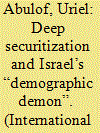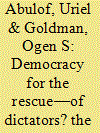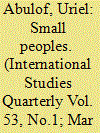|
|
|
Sort Order |
|
|
|
Items / Page
|
|
|
|
|
|
|
| Srl | Item |
| 1 |
ID:
136099


|
|
|
|
|
| Summary/Abstract |
Securitization theory's core contention—the social construction of security as a “speech–act”—is perceptive and productive, yet insufficiently attentive to societies engulfed in profound existential uncertainty about their own survival. Such societies are immersed in what I call “deep securitization,” whereby widespread public discourses explicitly frame threats as probable, protracted, and endangering the very existence of the nation/state. Under deep securitization, to politicize is to securitize, sectors intensely intertwine, political legitimacy's object is the polity/identity itself, and securitization steps are typically nonbinary and nonlinear. Empirically, if some securitizations are deeper than others, Israel's is one of the deepest. In this study, I examine this exceptionally apt, though little-examined, case for securitization theory. Israeli public discourse abounds with “existential threats,” invariably depicting the Jewish people and polity as endangered. The article analyzes the securitization of demography and its linkage to geography and democracy in the Israeli-Jewish discourse and praxis.
|
|
|
|
|
|
|
|
|
|
|
|
|
|
|
|
| 2 |
ID:
148297


|
|
|
|
|
| Summary/Abstract |
Intrastate conflicts, long eclipsing interstate conflicts, are often internationalized. This paper examines internationalized intrastate conflicts through the types of both the intervening and the embattled regimes. Do democracies, more or less than autocracies, support autocratic governments in their fights against rebels? This paper tests three hypotheses: (1) democracies support autocrats fighting rebels less than autocracies do. (2) Democracies support democratic governments fighting against rebels more than autocracies do. (3) The more democratic two states are, the higher the probability one would support the other’s fight against rebels. Covering all documented external support in intrastate wars (1975–2000), our findings support hypothesis one and two only partly and confirm hypothesis three. However, comparing the two major accounts of the Democratic Peace theory (DPT)—the normative and the structural—our findings corroborate only the former robustly. The paper thus helps enriching the insights of the DPT beyond interstate conflicts.
|
|
|
|
|
|
|
|
|
|
|
|
|
|
|
|
| 3 |
ID:
087587


|
|
|
|
|
| Publication |
2009.
|
| Summary/Abstract |
This exploratory paper attempts to extend the boundaries of research on the "smallness" of polities. It introduces the concept of "small peoples," a term coined by Czech author Milan Kundera to denote communities that lack a "sense of an eternal past and future." The paper posits "small peoples" as ethnic communities characterized by prolonged and deep-rooted uncertainty regarding their own existence. I argue that in modern times, "small peoples" doubt the validity of their past-based ethnic identity and the viability of their future-driven national polity. Empirically, I analyze two distinct "small peoples"-Israeli Jews and French Canadians (Québécois)-and argue that while the former have been more concerned with the future survival of their polity, the latter have been more concerned with insecurity about their identity. The paper suggests that a focus on communities and their intersubjective processes can enrich the study of states and their objective state.
|
|
|
|
|
|
|
|
|
|
|
|
|
|
|
|
|
|
|
|
|